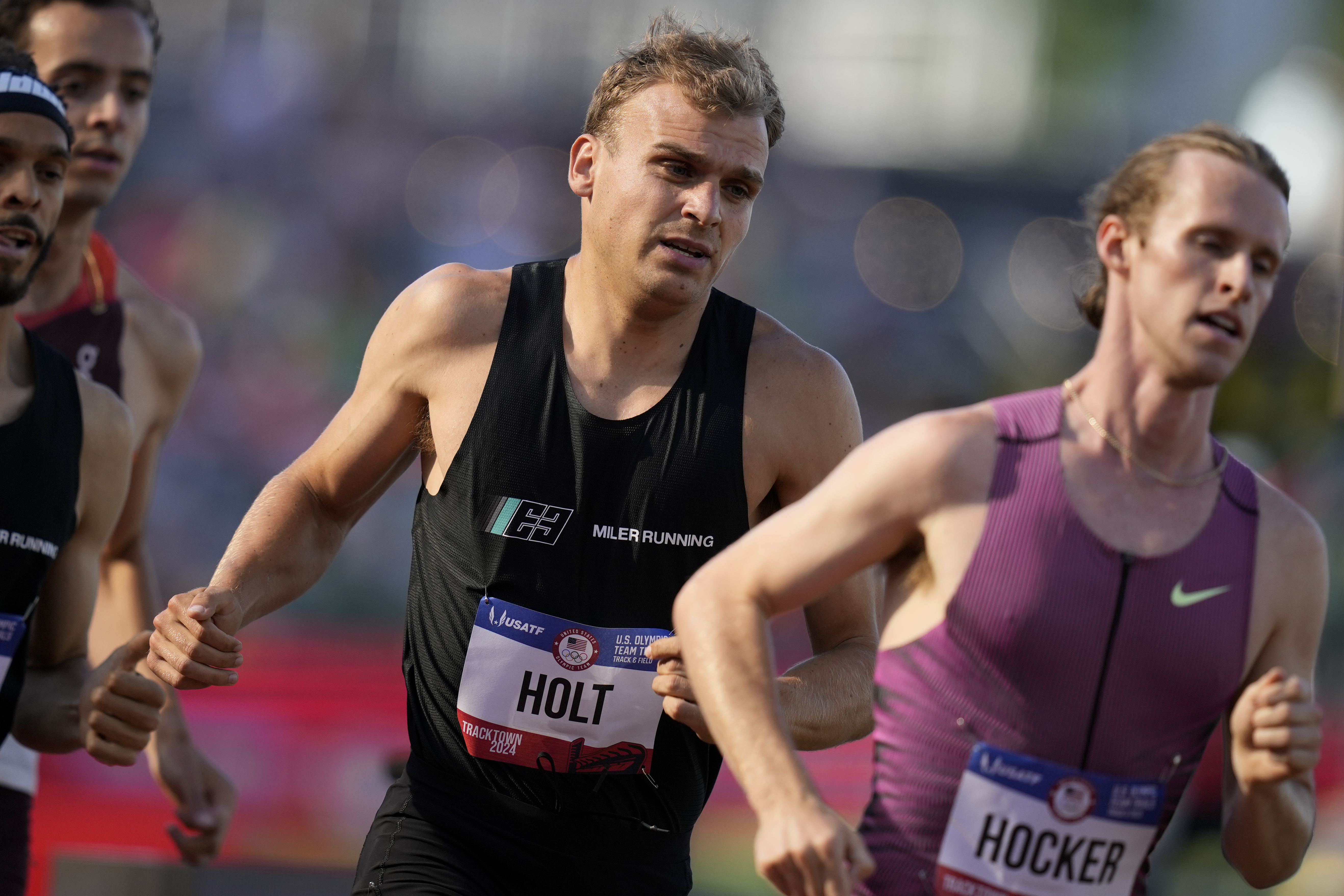
By PAT GRAHAM AP Sports Writer
EUGENE, Ore. (AP) — Middle-distance runner Eric Holt quit his job and moved back in with his parents. They pay his cell phone bill and let him use the car for a long commute to practice. He works out in any pair of running shoes he happens to get for free and babysits at his sister’s place for extra meal money.
Anything to keep his costs low and his training high.
Never quite fast enough to earn a lucrative shoe deal, he’s put everything on hold to chase a spot on the U.S. Olympic team in the 800 and 1,500 meters at track and field trials.

The 29-year-old from New York is making a big investment in himself.
“All of the struggles he’s had, all of the people that have said he can’t do it, that he’s not talented enough — this is the great American story,” his coach, John Trautmann, said as Holt advanced to the semifinal round of the 1,500 meters. “Hopefully, it has the All-American ending, too.”
Holt was a state champion in high school and a multi-time conference champion at Binghamton University. After that, he figured his running career was wrapping up.
His good friend, Jacob Sweet, wrote a lengthy paper on him as part of a creative writing project at Yale.

The title: “Running with Eric.”
The theme: Holt’s relentless quest to break the four-minute barrier in the mile. It included the lengths Holt traversed to achieve it, even shoveling snow from a lane of a track to train. It was an admirable determination from the “most tenacious and inspiring person I’ve ever met,” Sweet said in a text. “Just the nicest, most genuine guy in the world.”
What it really did was rekindle Holt’s drive.
“I mean, for me, just having someone believe in you goes a long way,” Holt said. “Having a friend like Jacob writing a paper about me, how he was so enthralled with my success, it just made me want to work hard. It made me love the sport again.”
Holt would center his training around working the late shift at a psychiatric ward as a mental-health worker. Sometimes, he’d log 13-hour shifts at his arduous job and then go to practice.

“I’ve been kicked in the knee. I’ve been punched,” Holt said. “I’ll never forget one day where I was struggling through a workout because my knee was swollen, because I got kicked right in the knee. It could be really tough.”
But his times were improving, even if the respect didn’t always follow. At the 2019 Monmouth Mile, he remembered the words of someone who was concerned he might “slow down the field,” Holt recalled. “It just motivated me.”
He won that day — in 3:58.88. At long last, he broke the 4-minute barrier.
“From there I saw light at the end of the tunnel,” Holt said. “I knew I could get a lot better.”
His late-night workouts drew the attention of Trautmann. He and fellow coach, Tom Nohilly, were looking at performances on Strava, an app that tracks exercise with a social-network component, when they noticed this runner in the area posting his training sessions at all hours.

They were intrigued. They discovered his background. They reached out.
That’s how Holt ended up at the Empire Elite Track Club with Trautmann, a standout at Georgetown and a 1992 Olympian in the 5,000 meters. Like Holt, Trautmann rediscovered his love of running. The 55-year-old Trautmann got away from the sport, steadily worked his way back into the running world and into coaching.
They just clicked.
“He believed in me,” said Holt, who made it to the semifinal round of the 1,500 at the 2021 Olympic trials. “The sky was the limit.”

First, some life modifications. He switched to the day shift at work before going all in and stepping away from his job about a year ago.
He had a nest egg built up.
To preserve his bank account any way he could, he followed his parents to Connecticut, which meant at least a 90-minute one-way commute to get to practice in Westchester County. He borrows his parents’ car for the trips and ate at home.
Holt sometimes received free shoes from local running stores (“I’ll wear whatever,” he said). But he did splurge on racing spikes. His girlfriend pays when they go out, with his solemn vow that someday, should he earn a sponsorship deal, he will treat.
“I’m frugal,” Holt said, “and I’m careful with my money.”

He said he received a $10,000 stipend from the USA Track and Field Foundation to help make ends meet. Even earning a little bit of prize money at small races is reason to celebrate — inexpensively, of course.
The idea of being sponsored?
“Getting paid a livable salary and doing what I love, it just sounds too good to be true,” he said.
Holt recently flashed his talent at the USATF NYC Grand Prix, finishing runner-up in the 1,500 meters to 2022 world champion Jake Wightman. It showed he was on the right track.
“I’m betting on myself,” Holt said. “I’m putting in the work and believe I’m talented and deserving enough to get a good contract.
“I want to show sponsors and the world that I am a contender, that I’m a good runner.”

